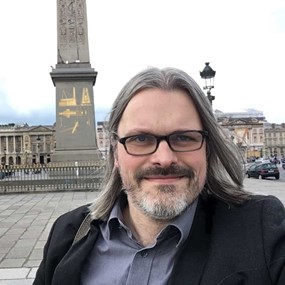Office Hours
By appointment
Education
PhD, University of London/UCL
BA, Trinity College Dublin
About Me
Ralph Kingston is an associate professor of European history (Revolutionary era). His research interests lie at the intersections of the cultural, intellectual, and social histories of eighteenth- and nineteenth-century France. He also has particular interests in the history of science, material history and the social history of place and space.
Kingston’s book, Bureaucrats and Bourgeois Society: Office Politics and Individual Credit in France, 1789-1848, was published by Palgrave Macmillan in 2012. This book looks at changes in administrative culture in the 1790s and their ongoing effects on the daily lives of office workers, one of the most visible (and most criticized) segments of a new nineteenth-century bourgeois society. One part of this study, on new office spaces during the French Revolution, was published in French History (2006). This article won the 2008 Southeastern American Society for Eighteenth-century Studies (SEASECS) Percy V. Adams prize.
During a postdoctoral British Academy fellowship held at University College London, Kingston began a new book-length project entitled Going Places, Exploring Spaces: French Expeditions and the Practice of Scientific Exploration, c.1750-1850. This book follows the men and women involved in proposing and patronizing, crewing and operating, debating and defining French explorations at sea and on land in late eighteenth and early nineteenth century. It places them in specific material and social spaces: the ship and the camp, the meeting rooms of Parisian learned societies, the museum, and the colonial outpost. Part of this project, published in articles in Endeavour and Annales historiques de la Révolution française, look at the failures and successes of scientific cooperation onboard early nineteenth-century voyages of discovery led by Nicolas Baudin and Louis de Freycinet.
In this project, digital history, and in particular digital mapping, has become a significant part of thinking through research questions. He is working with Auburn University’s digital librarians to build a portal for students interested in investigating the literary and scientific output of Napoleon’s expedition to Egypt, 1798-1802.
As well as teaching World History I and II, Kingston teaches courses on early modern and modern Europe, including 3000-level courses: European Explorations, Modern France, and Paris and the French Revolution; 5000-level courses: Enlightenment and Revolution, 1715-1815 and Nineteenth-Century Europe, 1815-1918; and graduate seminars on science and society in modern Europe, the French Revolution, and place and space in nineteenth-century France. He has also been given plenty of opportunities to teach senior thesis and graduate historical methods courses.
Kingston welcomes graduate applications from students interested in the social, cultural, and intellectual histories of the French Revolution and nineteenth-century France, including the history of science, technology, and the material history of place and space. Previous MA students have worked on a range of topics, including railway networks and the political culture of provincial cities, 1851-1918, and the politics of the Luxembourg Commission in the first months of the 1848 Revolution. Students interested in working with Kingston as an advisor are strongly encouraged to contact him in advance of submitting an application.
Research Interests
cultural, intellectual, and social histories of eighteenth- and nineteenth-century France
Publications
Books
- Bureaucrats and Bourgeois Society: Office Politics and Individual Credit in France, 1789-1848 (Palgrave Macmillan, 2012).
Articles
- “Surveillance at Work: a theft on the rue du Bac,” in Jennifer Heuer and Mette Harder, eds., Life in Revolutionary France (London and New York: Bloomsbury Press, 2020).
- "L’ombre de « Humboldt ! » : Travail d’équipe et travail d’écriture dans le voyage autour du monde de Louis de Freycinet (1817-1821)," Annales historiques de la Révolution française 385 (2016), In English as “Following ‘Humboldt!’: Teamwork and paperwork in Louis de Freycinet’s Voyage around the World, 1817-1821.
- "Armchair Expeditionaries: Voyages into the French Musée de la Marine, 1828-1878," in Martin Thomas, ed., Expedition into Empire: Exploratory Journeys and the Making of the Modern World (New York: Routledge, 2015).
- “Trading places: Accumulation as mediation in French ministry map depots, 1798–1810,” History of Science 52, no. 3 (2014).
- “Capitalism in the Streets: Paris Shopkeepers, Passages Couverts, and the Production of the Early Nineteenth-Century City,” Radical History Review 114 (Fall 2012).
- “Do ancient artifacts have politics?” (review article), Historical Studies in the Natural Sciences 41, no. 4 (Fall 2011).
- "The French Revolution and the Materiality of the Modern Archive," Libraries and the Cultural Record 46, no. 1 (March 2011).
- "Mind over Matter? History and the Spatial Turn" (review article), Cultural and Social History 7, no. 1 (March 2010).
- "A Not-So Pacific Voyage: the 'Floating Laboratory' of Nicolas Baudin," Endeavour 31, no. 4 (December 2007).
- "The Bricks and Mortar of Revolutionary Administration," French History 20, no. 4 [Special Issue on Spaces and Places] (December 2006).
- "The Men who Knew too Much: the Birth of Bureaucracy in Revolutionary France," in Hiram Morgan, ed., Information, Media and Power through the Ages (Dublin: UCD Press, 2001).
